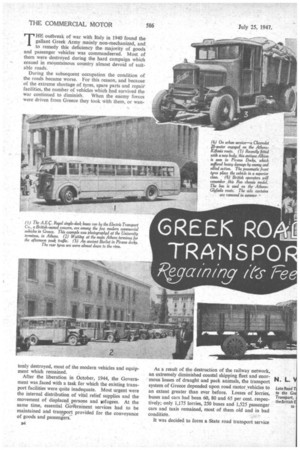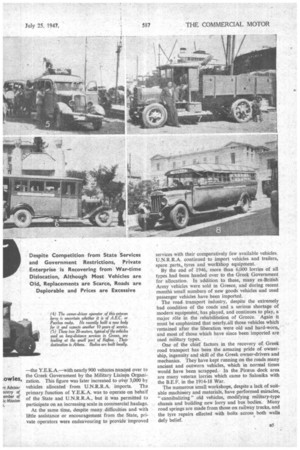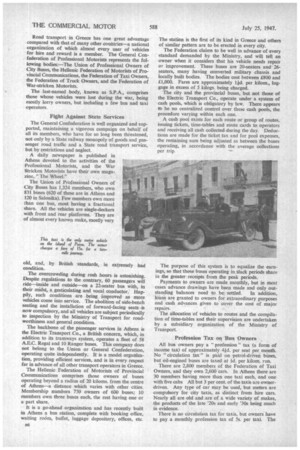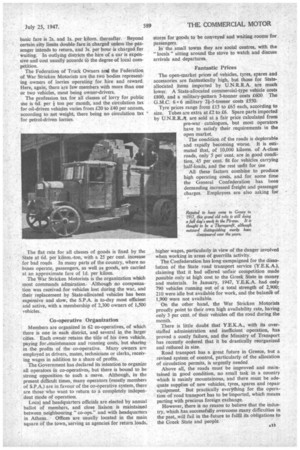GREEK RO TRANS P0
Page 38

Page 39

Page 40

Page 43

If you've noticed an error in this article please click here to report it so we can fix it.
149a ir? ng fs Fe Despite Competition from State Services and Government Restrictions, Private Enterprise is Recovering from War-time Dislocation, Although Most Vehicles are Old, Replacements are Scarce, Roads are Deplorable and Prices are Excessive THE outbreak of war with Italy in 1940 found the gallant Greek Army mainly non-mechanized, and to remedy this deficiency the majority of goods and passenger vehicles was commandeered. Most of them were destroyed during the hard campaign which ensued in mountainous country almost devoid of suitable roads.
During the subsequent occupation the condition of the roads became worse. For this reason, and because of the extreme shortage of tyres, spare parts and repair facilities, the number of vehicles which had survived the war continued to diminish. When the enemy forces were driven from Greece they took with them, or wan
tonly destroyed, most of the modern vehicles and equipment which remained.
After the liberation in October, 1944, the Government was faced with a task for which the existing transport facilities were quite inadequate. Most urgent were the internal distribution of vital relief supplies and the movement of displaced persons and r-fugees. At the same time, essential Government services had to be maintained and transport provided for the conveyance of goods and passengers.
B4 As a result of the destruction of the railway network, an extremely diminished coastal shipping fleet and enormous losses of draught and pack animals, the transport system of Greece depended upon road motor vehicles to an extent greater than ever before. Losses of lorries, buses and cars had been 60, 80 and 65 per cent. respectively; only 1,175 lorries, 250 buses and 1,525 passenger cars and taxis remained, most of them old and in bad condition.
It was decided to form a State road transport service —the Y.E.K.A.—with nearly 900 vehicles hanged over to the Greek Government by the Military Liais9n Organization. This figure was later increased to over 3,000 by vehicles allocated from U.N.R.R.A. imports. The primary function of Y.E.K.A. was to operate on behalf of the State and U.N.R.R.A., but it was permitted to participate on an increasing scale in commercial haulage.
At the same time, despite many difficulties and with little assistance or encouragement from the State, private operators were endeavouring to provide improved services with their comparatively few available vehicles, U.N.R.R.A. continued to import vehicles and trailers, spare parts,, tyres and worlZshop equipment.
13y the end of 1946, more than 6,000 lorries of all types had been handed over to the Greek Government for allocation. In addition to these, many ex-British Army vehicles were sold in Greece, and during recent months small numbers of new goods vehicles and used passenger vehicles have been imported.
The road transport industry, despite the extremely bad condition of the roads and a serious shortage of modern equipment, has played, and continues to play, a major role in the rehabilitation of Greece. Again it must be emphasized that nearly.all those vehicles which remained after the liberation were old and hard-worn, and most of those which have since been imported are used military types.
One of the chief factors in the recovery of Greek road transport has been the amazing pride of ownership, ingenuity and skill of the Greek owner-drivers and mechanics. They have kept running on the roads many ancient and outworn vehicles, which in normal times would have been scrapped. In the Pirmus dock area are many veteran lorries which came to Salonika with the B.E.F. in the 1914-18 War.
The numerous small workshops, despite a lack of suitable machinery and materials, have performed miracles, " cannibalizing " old vehicles, modifying military-type chassis and building new lorry and bus bodies. Many road springs are made from those on railway trucks, and the tyre repairs effected with bolts across both walls defy belief. Road transport in Greece has one great advantage compared with that of many other countries—a national organization of which almost every user of vehicles for hire and reward is a member. The General Confederation of Professional Motorists represents the following bodies:—The Union of Professional Owners of City Buses, the Hellenic Federation of Motorists of Provincial Communications, the Federation of Taxi Owners, the Federation of Truck Owners, and the Federation of War-stricken Motorists.
The last-named body, known as S.P.A., comprises those whose vehicles were lost during the war, being mostly lorry owners, but including a few bus and taxi Operators.
Fight Against State Services The General Confederation is well organized and supported, maintaining a vigorous campaign on behalf of all its members, who have for so long been threatened, not only by a State railway monopoly of goods and passenger road traffic and a State road transport service, but by restrictions and neglect A daily newspaper is published in Athens devoted to the activities of the Professional Motorists, and the War Stricken Motorists have their own magazine, " The Wheel."
The Union of Professional Owners of City Buses has 1,324 members, who own 831 buses (620 of these are in Athens and 120 in Salonika). Few members own more than one bus, most having a fractional share. All the vehicles are single-deckers with front and rear platforms. They are of almost every known make, mostly very old, and, by British standards, in extremely bad condition.
The overcrowding during rush hours is astonishing. Despite regulations to the contrary, 60 passengers will ride—inside and outside—on a 22-seater bus with, in their midst, a gesticulating and vocal conductor. Happily, such conditions are being impro'ved as more vehicles come into service. The abolition of side-bench seating and the installation of forward-facing seats is now compulsory, and all vehicles are subject periodically to inspection by the Ministry of Transport for roadworthiness and general condition.
The backbone of the passenger services in Athens is the Electric Transport Co., a British concern, which, in addition to its tramways system, operates a fleet of 58 A.E.C. Regal and 10 Ranger buses. This company does not belong to the Union or General Confederation, operating quite independently. It is a model organization, providing efficient services, and is in every respect far in advance of all other transport operators in Greece.
The Hellenic Federation of Motorists of Provincial Communications comprises those owners of buses operating beyond a radius of 20 kilorns. from the centre of Athens—a distance which varies with other cities. Membership numbers 750 owners of 600 buses; 10 members own three buses each, the rest having one or a part share.
• It is a go-ahead organization and has recently built in Athens a bus station, complete with booking office, waiting room, buffet, luggage depository, offices, etc. The station is the first of its kind in Greece and others of similar pattern are to be erected in every city.
The Federation claims to be well in advance of every standard demanded by the Ministry, and will tell an owner when it considers that his vehicle needs repair or improvement. These buses are 20-seaters and 26seaters, many having converted military chassis and locally built bodies. The bodies cost between £800 and £1,000. Fares are approximately lid. per kilorn., luggage in excess of 5 kilogs. being charged.
The city and the provincial buses, but not those of the Electric Transport Co., operate under a system of cash pools, which is obligatory by law. There appears to be no centralized control over these cash pools, the procedure varying within each one.
A cash pool exists for each route or group of routes, issuing tickets, time-tables and route cards to operators and receiving all cash collected during the day. Deductions are made for the ticket tax and for pool expenses, the remaining sum being adjusted as between the buses operating, in accordance with the average collections per trip.
The purpose of this system is to equalize the earnings, so that those buses operating inslack periods share in the greater receipts from the peak periods.
Payments to owners are made monthly, but in most cases advance drawings have been made and only out standing balances need to be settled. In addition, loans are granted to owners for extraordinary purposes and cash advances given to cover the cost of major repairs.
The allocation of vehicles to routes and the compilation of time-tables and their supervision are undertaken by a subsidiary organization of the Ministry of Transport.
Profession Tax on Bus Owners All bus owners pay a " profession " tax (a form of income tax) of approximately 41d. per seat per month. No "circulation tax" is paid on petrol-driven buses, but oil-engined buses are taxed at id. per idiom. run.
There are 2,800 members of the Federation of Taxi Owners, and they own 2,600 'cars. In Athens there are 30 members having more than one taxi each, and one with five cabs All but 3 per cent. of the taxis are ownerdriven, Any type of car may be used, but meters are compulsory for city taxis, as distinct from hire cars. Nearly all are old and are of a wide variety of makes, the products of the late '20s and early '30s being much in evidence.
There is no circulation tax for taxis, but owners have to pay a monthly profession tax of 5s. per taxi. The basic fare is 2s. and is. per kilom. the,reafter. Beyond certain city limits double fare is charged unless the passenger intends to return, and 3s. per hour is charged for waiting. In outlying districts the hire of a car is expensive and cost usually accords to the degree of local competition.
The Federation of Truck Owners and the Federation of War Stricken Motorists are the two bodies representing owners of lorries operating for hire and reward. Here, again, there are few members with more than one or two vehicles, most being owner-driver& The profession tax for all classes of lorry for public use is 6d. per ton per month, and the circulation tax for oil-driven vehicles varies from £20 to £40 per annum, according to net weight, there being no circulation tax for petrol-driven lorries.
The flat rate for all classes of goods is fixed by the State at 6d. per kilom.-ton, with a 25 per cent. increase for bad roads In many parts of the country, where no buses operate, passengers, as well as goods, are carried at an approximate fare of id. per Idiom.
The War Stricken Motorists is the organization which most commands admiration. Although no compensation was received for vehicles lost during the war, and their replacement by State-allocated vehicles has been expensive and slow, the S.P.A. is to-day most efficient and active, with a membership of 2,300 owners of 1,500 vehicles.
Co-operative Organization Members are organized in 62 co-operatives, of which there is one in each district, and several in the larger cities. Each owner retains the title of his own vehicle, paying for.maintenance and running costs, but sharing in the profits of the co-operative. Many owners are employed as drivers, mates, technicians or clerks, receiving wages in addition to a share of profits.
The Government has declared its intention to organize all operators in co-operatives, but there is bound to be strong opposition to such a move. Although, in the present difficult times, many operators (mostly members of SPA.) are in favour of the co-operative system, there are those who want to return to a completely independent mode of operation.
Local and headquarters officials are elected by annual ballot of members, and close liaison is maintained between neighbouring" co-ops." and with headquarters in Athens. Offices are usually located in the main square of the town, serving as agencies for return loads, stores for goods to be conveyed and waiting rooms for passengers. In the small towns they are social centres, with the " locals " sitting around the stove to watch and discuss arrivals and departures.
Fantastic Prices The open-market prices of vehicles, tyres, spares and accessories are fantastically high, but those for Stateallocated items imported by U.N.R.R.A. are much lower. A State-allocated commercial-type vehicle costs £800, and a military-pattern 3-tonner costs £600. The G.M.C, 6)< 6 military 21-5-toriner costs £550.
Tyre prices range from £15 to £65 each, according to • size. Tubes are extra at £2 to £6. Spare parts imported by U.N.R.R.A. are sold at a fair price calculated from pre-war • catalogues, but most operators have to satisfy their requirements in the open market.
The condition of the roads is deplorable and rapidly becoming worse. It is estimated that, of 10,000 kiloms. of A-class roads, only 5 per cent. are in good condition, 45 per cent, fit for vehicles carrying half-loads, and the rest unfit for use All these factors combine to produce high operating costs, and for some time the General Confederation has been demanding increased freight and passenger charges. Employees are also asking for higher wages, particularly in view of the danger involved when working in areas of guerrilla activity.
The Confederation has long campaigned for the dissolution of the State road transport service (Y.E.K.A.). claiming that it had offered unfair competition made possible only at high cost to the Greek State in money and materials. In January, 1947, Y.E.K.A. had only 790 vehicles running out of a total strength of 2,900; 210 were idle but available for work, and the balande' of 1,900 were not available.
On the other hand, the War Stricken Motorists proudly point to their own high availability rate, having only 3 per cent. of their vehicles off the road during the month.
There is little doubt that Y.E.K.A., with its overstaffed administration and inefficient operation, has proved a costly failure, and the Ministry of Transport has recently ordered that it be drastically reorganized and reduced in size.
Road transport has a great future in Greece, but a revised, system of control, particularly of the allocation of circulation permits, is urgently needed Above all, the roads must be improved and maintained in good condition, no small task in a country which is mainly mountainous, and there must be adequate supplies of new vehicles, tyres, spares and repair equipment. But practically everything for the operation of road transport has to be imported, which means parting with precious foreign exchange.
However, there is no reason to believe that the industry, which has successfully overcome many difficulties in the past, will fail in the .future to fulfil its obligations to the Greek State and people.












































































